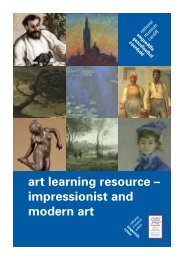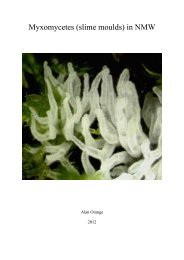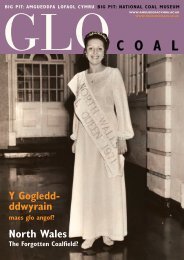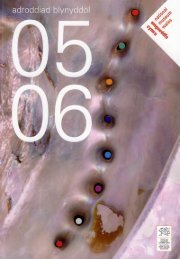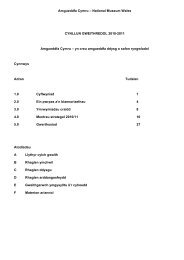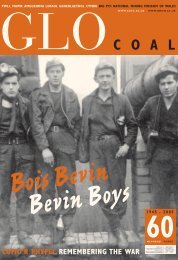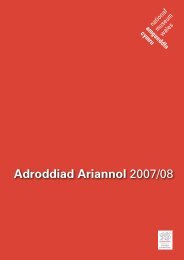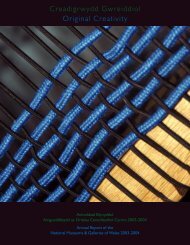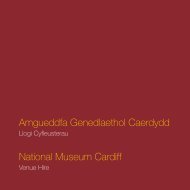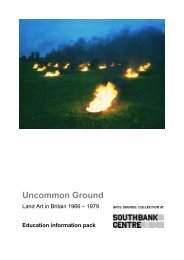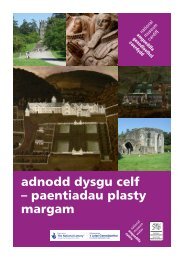You also want an ePaper? Increase the reach of your titles
YUMPU automatically turns print PDFs into web optimized ePapers that Google loves.
Beth yw bag<br />
tri chwarter?<br />
What’s a three<br />
quarter bag?<br />
Cefais fy ngeni ar 15 Mehefin 1944. Gadewais<br />
yr ysgol ym 1960 ac es i am brentisiaeth gyda’r<br />
Bwrdd <strong>Glo</strong> Cenedlaethol yng Nglofa Bargod.<br />
Cawsom ein hanfon i’r ysgol hyfforddi yng Nglofa<br />
Britannia ac rwy’n credu i ni dreulio’r flwyddyn<br />
gyntaf yno. Arferem astudio yng Ngholeg Addysg<br />
Bellach Cross Keys yn y dyddiau hynny, felly fe wnes<br />
i brentisiaeth peirianneg glo am bum mlynedd.<br />
Roedd gen i gefndir glofaol, gyda ’nhad yn<br />
ffeiarman yng nglofa Elliot ger Tredegar Newydd ac<br />
yna yng Nglofa Britannia. Dechreuodd fel glöwr, cyn<br />
mynd ymlaen i astudio a dod yn swyddog diogelwch<br />
yng Nglofa Britannia. Bu farw danddaear yn y<br />
diwedd, wrth dywys ymwelwyr o gwmpas. Cafodd<br />
drawiad ar y galon, ond erbyn iddyn nhw ei gludo’n<br />
ôl i’r brig, roedd wedi’n gadael ni. Dim<br />
ond 52 oed oedd e.<br />
Wnes i erioed ystyried unrhyw beth<br />
heblaw mynd i weithio danddaear ar ôl<br />
gadael ysgol – wedi’r cwbl, roedd fy<br />
nhad yn löwr, a’r lofa oedd prif gyflogwr<br />
yr ardal. Er bod llawer o gwmnïau<br />
peirianneg bach yn yr ardal, wnes i<br />
ddim ystyried gwneud cais am swydd<br />
gyda nhw, felly penderfynais fwrw<br />
prentisiaeth gyda’r NCB fel llawer o’m<br />
ffrindiau. Dyma oedd y prif gyflogwr<br />
bryd hynny. Mae’n stori wahanol iawn<br />
heddiw, wrth gwrs, mae’r pyllau glo<br />
wedi hen ddiflannu tydyn?<br />
Roedd gweithio yn y diwydiant<br />
glo yn dipyn o her. Roeddech chi’n<br />
treulio’r flwyddyn gyntaf yn ysgol<br />
hyfforddi Britannia, a rhywfaint o<br />
amser yn y lofa ei hun hefyd – yn y<br />
gweithdai ac o dan y ddaear, a<br />
bydden ni’n ymweld â glofeydd eraill<br />
hefyd. Doedd dim llawer o fywyd<br />
cymdeithasol yn y lofa fel y cyfryw –<br />
roeddech chi’n mynd i’r gwaith, dod<br />
adref, a dyna ni. Er bod<br />
sefydliadau’r glowyr ym mhob<br />
pentref, rhywbeth o’r oes o’r blaen<br />
oedden nhw, a doedd dim gymaint<br />
o fynd arnyn nhw erbyn fy<br />
nghyfnod i. Mwynheais i’r<br />
diwydiant glo ar y cyfan, oherwydd<br />
roedd yn brofiad da ar gyfer y<br />
dyfodol.<br />
Ni arhosais yn y lofa; roedd fy<br />
nhad yn dioddef o’r emffysema ar<br />
ôl gweithio danddaear ac nid<br />
oedd yn awyddus i mi barhau’n<br />
löwr. Dwi’n credu ’mod i wedi<br />
Y diwrnod gwaith olaf<br />
yng Nglofa Bargod – Mai 1977<br />
Bargoed Colliery –<br />
last day of work May 1977<br />
Iwas born on the 15th of June 1944. I le school in<br />
1960 and I went in for an apprenticeship with the<br />
<strong>National</strong> Coal Board and I was based at Bargoed<br />
Colliery. We used to go to a training school in<br />
Britannia Colliery and I think we spent the first year<br />
there. We used to study at Cross Keys College of<br />
Further Education in those days, so for five years I did<br />
a mining engineering apprenticeship.<br />
I came from a mining background, my father was<br />
a fireman in Elliot’s colliery near New Tredegar and,<br />
later, Britannia Colliery. He started off as a miner and<br />
he studied and he ended up being the safety officer in<br />
Britannia Colliery. He actually died underground, he<br />
was taking visitors to the colliery underground and<br />
he had a heart attack and by the time they got back to<br />
the surface there was nothing they could do and he<br />
died. He was only 52 years of age.<br />
I never really thought about not going<br />
underground when I le school. I suppose with my<br />
father being in the colliery and the fact that mining<br />
was the main employer around here. ere were a lot<br />
of little engineering companies around here, but it<br />
didn’t cross my mind to try for work with them so,<br />
along with a lot of my friends, I went in for an NCB<br />
apprenticeship. It was the main employer of those<br />
days. It’s very different today, there are no mines le<br />
are there?<br />
Working in the mining industry was challenging.<br />
You spent the first year in the training school in<br />
Britannia but you would also spend time on the<br />
colliery itself in the workshops and below ground and<br />
we also visited other collieries. ere wasn’t much of<br />
a social life connected with the mine as such – you<br />
went to work, you came home and that was it. ere<br />
were miner’s institutes in all the villages but I think<br />
they were of a bygone age when I came along and they<br />
weren’t so frequented as they had been in the past. On<br />
the whole I enjoyed the mining industry it prepared<br />
me well for the future.<br />
I didn’t stay in the colliery; my father had<br />
emphysema from working underground and wasn’t<br />
keen for me to stay in mining. I think I always looked<br />
at getting out aer I served my apprenticeship. I was<br />
looking at a career such as the Merchant Navy and<br />
then this thing came up about atomic energy. ey<br />
were looking for qualified people so, before I’d actually<br />
finished my NCB apprenticeship, I went for an<br />
interview in Bristol and they told me to get in touch<br />
with them when I’d finished my apprenticeship about<br />
three or four months later. ey offered me a position<br />
and I went to Harwell nuclear power station for about<br />
three or four months and from there I transferred to<br />
Weymouth and later to Winfrith, I stayed there about<br />
seven years.<br />
ere was a big difference between the nuclear<br />
power industry and coal mining. You didn’t have to<br />
shower everyday to get the coal out of your eyes and<br />
your hair for a start, it was much more pleasant. e<br />
terminology was also different, I remember going to<br />
the stores and asked for some three quarter bag and<br />
the guy’s looking at me stupid, he said “What’s a three<br />
quarter bag?” He eventually worked out that it was<br />
three quarter hose pipe that’s what I wanted! I<br />
enjoyed the atomic energy because it was totally<br />
different from mining. You were always in clean<br />
conditions; you were always well protected from the<br />
dangers of radiation as working practices were very<br />
strict, how you went in and out of certain areas and<br />
so on.<br />
I didn’t stay in atomic energy. ere were quite a<br />
few of us youngsters who decided that we were going<br />
to go abroad. So off my wife, two children and I all<br />
went to Mufulira on the Copper Belt in Zambia. I<br />
didn’t go underground in the copper mine and I<br />
wasn’t unhappy about that because they were very,<br />
very deep mines, I worked on the surface in the power<br />
plant instead. Zambia was a nice country, the living<br />
conditions were ok and we made some money but we<br />
decided we’d go down to what was then Rhodesia and<br />
is now Zimbabwe.<br />
So we went down to Salisbury in Rhodesia in 1972<br />
and worked for an electrical cable manufacturer. I<br />
started off in the workshops and worked there for<br />
seven years and then I took over as the workshop<br />
foreman and then I had the opportunity to become<br />
works manager at Phoenix Brushware who<br />
manufactured brushes and plastic packaging and I<br />
started off there as the works manager running the<br />
factory. Aer I’d been there for about five years, they<br />
asked me to take over as the chief executive and take<br />
over responsibility for running the company I stayed<br />
there until 2000.<br />
When we went there in 1972 it was still Rhodesia<br />
and there was a guerilla war going on. Aer about a<br />
year I was called up to the forces I had to do basic<br />
army training, weapons, marching and all the rest of<br />
it. en aer that they sent us out to what they called<br />
‘keeps’ which were fortified enclosures or towers.<br />
ey had ‘keeps’ in the middle of villages throughout<br />
the country and you were based there to look aer the<br />
20<br />
21



